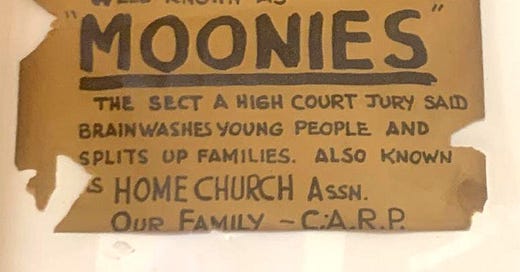READ: Research inspirations: Eileen Barker
Eileen Barker is one of those people that is very famous in a very specific way. She has been at the forefront and centre of research into what are variously called ‘cults’, ‘new religious movements’ and ‘spiritual but not religious’ people for more decades than she probably cares to remember. She even has her own Wikipedia page.
Before I talk about her research legacy, it’s worth mentioning that in the small, close-knit, and friendly world of Religious Studies academics here in the UK, she is considered a national treasure. She’s still a vibrant presence at conferences and events, at an age when many in her position would have retired to a quiet life, content with her legacy. As an anonymous colleague of mine said ‘I would protect Eileen with my life!’ (He went on to accidentally lock her in the conference building alone and run off with her bag, but I digress.)
Eileen inspires such loyalty in part because of her contributions to scholarship over the decades, but also because, like any truly talented academic, she continues to take an insightful interest into the new and emerging work of other scholars. She is both part of the foundation on which we build, and a key partner in the conversations we are having today. She also inspires loyalty because she has always attracted significant criticism from both religious people and researchers, especially those from the field of ‘Cultic Studies’. Luckily, we think she thrives on it.
Eileen’s career began with a PhD in the sociology of religion from LSE in 1970, but it really took off with the founding of INFORM in 1988. Her early work was with the Unification Church (sometimes known as the Moonies), and she had become convinced that much of the societal response to this and similar organisations was based in ignorance and hysteria. She has never denied the very real harm some new religious groups can do, nor the grief and confusion of families who find it hard to understand their loved ones’ conversions to a new worldview. But she also knew that many devotees of gurus, New Age ideals and those with similarly ‘unusual’ religious identities were living happy and fulfilled lives.
She drew the ire of many anti-cult specialists by pointing out the vast amount of money given by desperate families to those who promised to ‘deprogram’ their loved ones, and that the science behind the term ‘brainwashing’ was tenuous at best. INFORM was established to attempt to provide fair and unbiased information about any ‘new religious movement’ to both state organisations and individuals here in the UK and beyond. Anecdotally, INFORM considers itself to be doing a good job if everyone – happy adherents, traumatised ex-members and estranged families – are equally annoyed with them.
Keep reading with a 7-day free trial
Subscribe to Theo’s Substack to keep reading this post and get 7 days of free access to the full post archives.




